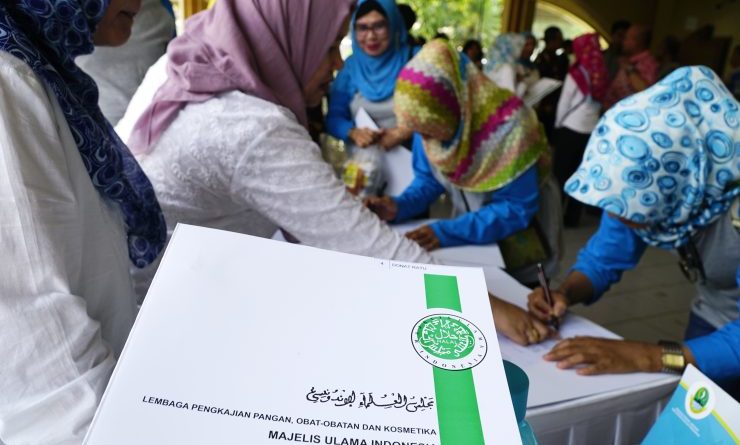Jakarta: BPJPH – MINISTRY OF RELIGIOUS AFFAIRS – OBLIGATORY HALAL REQUIREMENTS LACK CLARITY AND FOCUS
.

.
Jakarta. Indonesia’s 2014 Law on Halal Product Assurance will make halal labeling mandatory for many goods and services imported to and distributed and traded in the country by 2019.
The law marks a radical change to how business is done in the country currently, as halal certification is still voluntary.
But instead of welcoming the new halal regulation, businesses and consumers have raised concerns that the new law will limit their ability to bring the best quality goods and services to the Indonesian market — or indeed, to buy them.
Under the new law, a wide range of goods and services — including food and beverages, medicine, cosmetics, chemical products, biological products and genetically-modified products — must carry a halal certificate issued by the Halal Product Assurance Implementing Board, or BPJPH, an agency run by the Ministry of Religious Affairs.
Unclear Definitions
But critics say the law contains many vague stipulations that could cause problems for existing businesses.
For example, the law also stipulates that “goods that can be used, worn, or used by people” also need to be halal-certified.
The authors of the law might have had clothes, bags or shoes in mind when they drafted the law, but since the regulation does not offer more detailed descriptions of the goods, it opens itself to widely varied interpretations.
That is one of many objections to the new Halal Law brought up before the Constitutional Court by a lawyer named Paustinus Siburian earlier this year. The case is currently still ongoing.
“Because the Halal Law does not incorporate Sharia rules, it’s going to be difficult for Indonesians to understand the law […] what references does the BPJPH use to determine what is halal or haram,” Paustinus said in the plea document.
The halal board will also need to determine what types of services need to be halal-certified or not, since Islamic texts cannot offer clear definitions on this front, Paustinus said.
The new law may cause problems for businesses that deal in haram, or non-halal products, such as alcohol and pork. The law stated that they can just slap on a label clearly indicating the product is not halal and be done with it, but the reality may be more complicated.
Under the law, the BPJPH will have to supervise each stage of production of any product, distribution and how it is served to consumers. That means even non-halal products have to go through the exhaustive process.

.
Unclear Process
Pharmaceutical companies have also raised questions about how they should go about getting their products halal-certified, pointing out that drug production often involves a long supply chain and a complicated manufacturing process that could make it very difficult and costly to certify.
“We support the spirit of the Halal Law to protect consumers. But this rule is difficult to implement,” Parulian Simanjuntak, the executive director of International Pharmaceutical Manufactures Group (IPMG), said.
“If the government insists on implementing it, pharmaceutical companies may not dare to produce anymore drugs for fear of sanctions. And that will disrupt the supply of some much-needed drugs to the public,” he said.
Garment and textile companies, meanwhile, say that the additional requirements to ensure their products comply to the new Halal Law will make it more difficult for them to compete with cheaper products from neighboring countries like Vietnam.
There is also a question over the capacity of local facilities to test and certify millions of goods and services.
Who Wants Halal Law? Not Just Muslims
Proponents of the Halal Law however said it is necessary to protect Indonesian Muslims, who make up more than 80 percent of Indonesia’s total population.
“It is a form of Constitution-mandated state protection for our Muslim community,” Ikhsan Abdullah, the executive director of Indonesia Halal Watch, told the Jakarta Globe in an interview at his office in Central Jakarta on Wednesday (27/09).
Ikhsan referred to the state-guaranteed freedom for every Indonesian citizen to choose his or her own religion and to worship according to his or her religion and beliefs.
Market-wise, halal certification should protect Indonesia’s domestic market from overseas competition and also open up opportunities to grab a larger share in the global halal market, Ikhsan said.
Many producers from non-Muslim majority countries have also embraced halal certification, recognizing a growing global trend for halal products and services. Nestlé, for example, is now the world’s biggest halal food producer company, dedicating more than a third of its 418 factories across the globe to supply halal-compliant products to 57 Muslim majority countries.
The global market for halal food and lifestyle products is expected to grow to $2.5 trillion in 2019 from $2 trillion today, according to a report from Thomson Reuters.
Assurance Is More Important
Kirana Agustina, a Muslim woman who lives in Jakarta, said that halal certification in products and services would give convenience for consumers in Indonesia in which Muslims are the majority.
“However, the government should not implement the law indiscriminately, particularly with consideration of limited capacity of small businesses such as fried banana sellers,” Karina, who work as a communications officer for an environmental organization, said on Wednesday.
Given a hypothetical scenario, she said she would walk 500 meters farther to buy fried snacks at vendor with a halal certification rather than at a vendor without it close by.
“Because, it has assurance, even if it was only fried bananas,” Kirana said.
Writing by Dion Bisara
Courtesy: The Jakarta Globe | Dames Alexander Sinaga
<>
NOTE : All photographs, news, editorials, opinions, information, data, others have been taken from the Internet ..aseanews.net | [email protected] |
For comments, Email to :
Aseanews.Net | [email protected] | Contributor









